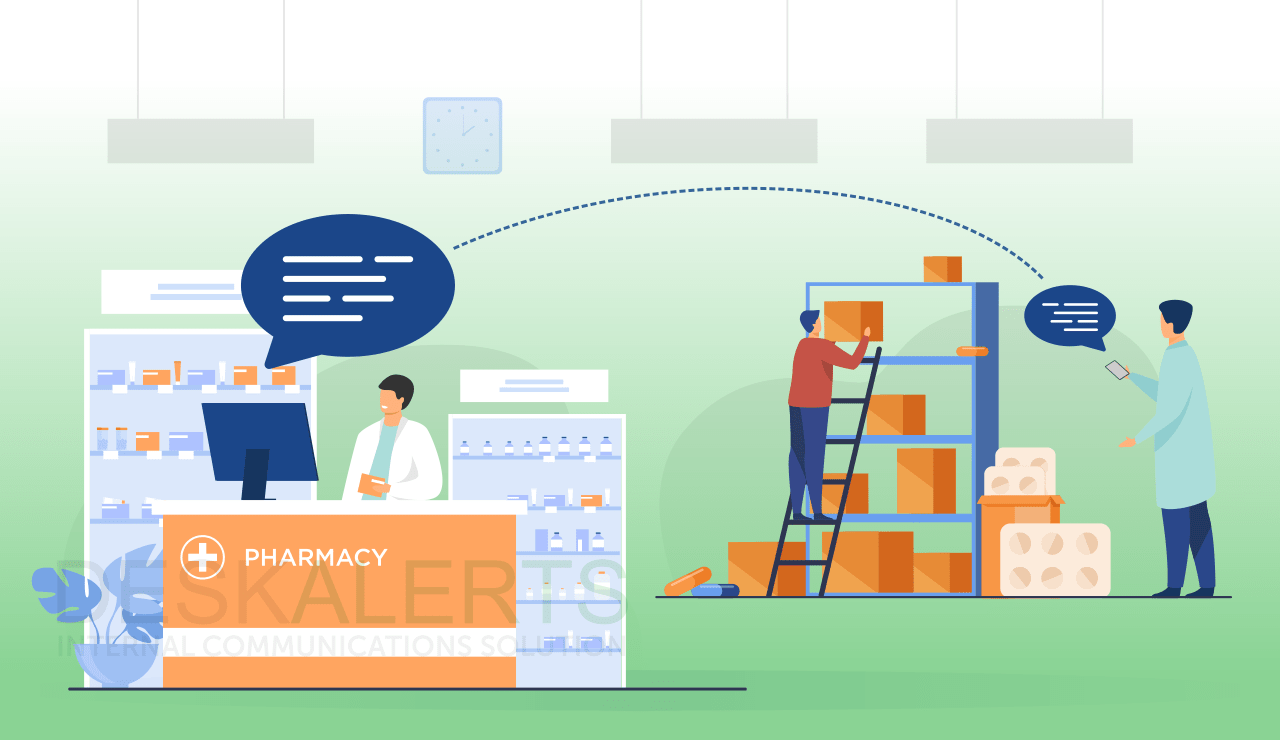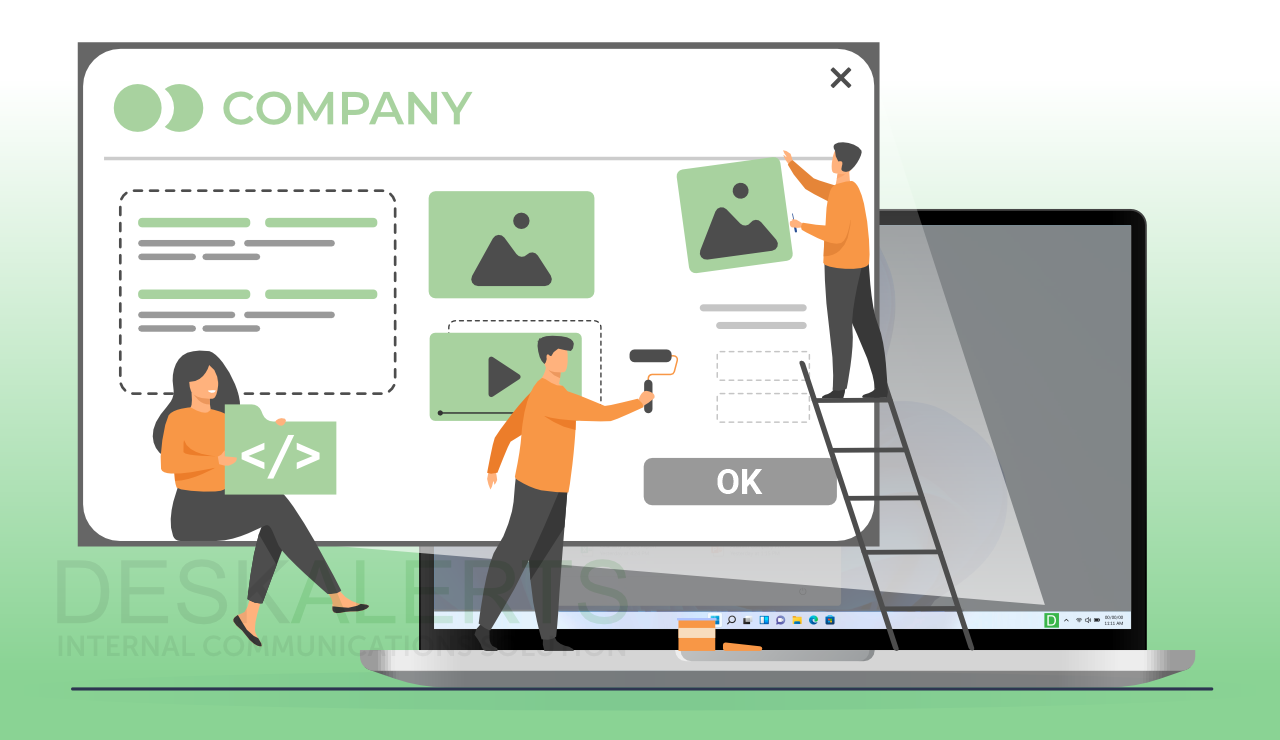13 min read
Top Internal Communication Trends in 2025 and How Businesses Are Adapting [+ Examples]
Historically, internal communication tracked engagement metrics like email open rates, clicks, or survey participation. However, in 2025, the focus...
7 min read
 Caroline Duncan
:
Aug 19, 2021 9:56:04 AM
Caroline Duncan
:
Aug 19, 2021 9:56:04 AM

Pharmaceutical companies are often large and complex organizations with staff working across multiple departments and multiple sites around the world, striving towards common goals. While they’re often great at communicating with external stakeholders, they can sometimes overlook one of the most critical aspects of communication – communicating with employees.
Table of contents
Why is communication important in the pharmaceutical industry
Challenges In the pharmaceutical industry to address with effective internal communication
DeskAlerts internal communication solution for pharma communications
How different teams in your pharmaceutical company can use DeskAlerts
Real-life examples of DeskAlerts clients in the pharmaceutical industry
Effective internal communication is the lifeblood of a large organization, such as a pharmaceutical company. When internal communication is prioritized, employees at every level and every location are given timely and relevant information so that they understand corporate goals and priorities, projects, initiatives and any arising issues.
Chronic health conditions in recent years have placed pressure on the healthcare sector, which has turned to the pharmaceutical industry to develop solutions. This has been further heightened by the COVID-19 pandemic, putting pressure on pharmaceutical companies to develop vaccines and treatments to deal with the virus in quick timeframes.
Internal communication is pivotal in ensuring the success of these projects.
Manufacturing teams in the pharmaceutical industry, for example, generally rely on a great deal of face-to-face communication as they are used to working together closely.
It’s important to set parameters about how communication will work within the team – as well as how the team will communicate with other teams in the organization. Without effective communications for pharmaceutical teams, your employees can:
A Holmes Report study found that companies with strong internal communications can deliver 47% higher returns to their shareholders.
There are no downsides to improving internal communication: only positives.

Like any industry, the pharmaceutical industry has its own unique set of challenges that can both be an obstacle to effective internal communication and be improved by effective internal communication.
One of the major HR challenges in the pharma industry is keeping employees motivated and engaged, as well as retaining talent.
Across the industry, there is a skills shortage that is driving salaries up as people pursue opportunities with higher monetary benefits. When employees move on to a new company, they take their experience and corporate knowledge with them, and in the current environment, it can be difficult to replace them.
And of course, money isn’t the only reason why employees leave companies.
According to a New York Times study, employees who are passionate about their work and feel as though it gives them a sense of purpose are three times more likely to stay with their companies than those who do not.
Disengaged employees are more likely to leave their company to pursue opportunities elsewhere.
Employees become disengaged for a range of reasons, but poor internal communication is often at the root of them. This includes lack of direction, an inability to feel a personal connection with the company, a lack of understanding of the company’s goals, poor company culture, and poor leadership. Improving these factors can help with both engagement and retention.
A range of internal communications strategies and activities can help to boost engagement. This includes surveying employees to understand their levels of engagement and then putting mitigation strategies in place. Reward and recognition programs, flexibility, team-building exercises, and an improvement in the quality and quantity of internal news items can all assist.
Compliance in the pharma industry is one of the sector’s top priorities. There are a range of regulatory standards that pharmaceutical companies must abide by, and not doing them or cutting corners has the potential to damage the company and its reputation catastrophically. Every single employee needs to understand the rules and regulations that they have to follow, and why it is important.
Implementing a corporate compliance program can help you to keep track of all your various regulatory requirements. As part of this program, you should develop a targeted internal communications strategy that is used to remind employees of their obligations and reminders around things like due dates and deadlines. Compliance training – including refresher training – should also form a part of this.
As pharmaceutical companies roll out continuous, 24/7 manufacturing to keep up with demand, this means that employees are in the workplace around the clock, working across a number of shifts each day. Shift-to-shift communications are important to ensure that if there are any issues, the next shift knows about them so they can be productive.
Added to this, different plants may be located in different locations, even in different countries and continents. Other parts of the company might be based in corporate offices, warehouses or be on the road working in transport and logistics or sales roles.
This means that some traditional internal communication strategies where everyone in the company works in the same office building, 9-5 Monday to Friday, are outdated and irrelevant.
Pharmaceutical companies should consider investing in tools that will help them reach employees regardless of when and where they work to ensure that everyone has access to the same information and nobody is overlooked.
Internal communications software can help to overhaul company communications. Consider targeted deliveries to reach the specific groups of people you need to reach, sending messages that you can schedule ahead of time for different time zones and employee apps or SMS messages to reach people who aren’t in an environment with computer access.
Quality control issues have the ability to affect the company’s outputs and can also lead to major issues if unchecked, such as product recalls or patient deaths and lawsuits. Having an effective internal communications system in place to notify staff about any issues that are detected is paramount. It is also critical that companies have robust systems where employees can communicate quickly and easily with management when they identify a problem.
Sending pop-up alerts and notifications to employees is a great way to keep them informed about any quality control concerns. These can also be aligned with existing systems that you use within your company to notify about any issues.
Cyber attacks are becoming more and more prevalent each year, and the pharmaceutical industry is not immune from this. Phishing, ransomware, denial of service attacks and hacking attempts are just some of the cybersecurity threats that the pharma industry is exposed to.
Intellectual property theft is one of the biggest risks for pharmaceutical companies if they do find their systems compromised. Cybersecurity risks in the pharma industry include losing complete access to systems, extended periods of downtime and disruption, financial losses and potential legal consequences.
Every employee in your organization has a role to play in keeping your systems and data safe. It’s important to regularly communicate cybersecurity issues to them, including what to look out for and what steps they need to take. Emerging threats should also be communicated as quickly as possible to mitigate risk.
Use tools like corporate screensavers and digital signage to remind staff about cybersecurity issues and send hints and tips. Pop-up alerts and scrolling desktop tickers are also useful for sending reminders or alerts to let people know about new threats. You can also test your employees’ knowledge by sending them quizzes.
Emergency situations can happen at any time, with little to no warning. Whether it’s a fire, a natural disaster, a chemical leak, a shooter or some other calamity, it’s important that you have systems in place to inform your employees in as little time as possible: after all, every single second counts.
Sometimes you may need to lock down an entire plant or facility if there is a dangerous situation nearby. Other times you may need employees to evacuate or shelter in place: providing clear and timely instructions can help to save lives and reduce injuries.
An emergency alert system that reaches employees, whether they are on-site or off, is one of the best tools you can have in your internal communications arsenal.
DeskAlerts is one of the best ways to reach your workforce when they work different shifts and are located in different buildings. DeskAlerts is an internal communications software system that is available for PC, Mac and Android and Apple phone and tablet devices. When it is installed, it enables you to send information to your employees using a variety of digital tools and channels that are guaranteed to get their attention. Channels include:
Messages can be scheduled in advance and can be sent to different audience segments, for example, all employees at a particular facility or all employees who work on a particular shift. The system is designed to be deliberately intrusive so that your employees will not miss out on important and urgent information.
One of the great things about DeskAlerts is that any team can use it in the organization that needs to communicate regularly with employees.
Examples for pharmaceutical communications include:
KRKA is an international pharmaceutical company with headquarters in Slovenia. It sells products to more than 70 countries around the world.
The company needed a way to inform employees, particularly manufacturing line operators, about system failures, maintenance, upgrades and other important events. These employees used different devices: some used terminals and others were in offices using the company intranet.
KRKA has integrated DeskAlerts with its intranet to inform employees about these important events quickly. Prior to using DeskAlerts, it could take two to three hours to inform all the necessary people about these types of events (sending emails and calling) and several people were required to do the job. Now the company can quickly and easily alert the right people at the right time. Using the alerts system has also helped decrease the number of calls to the technical support department.
Baxalta is a biopharmaceutical company that used to be a subsidiary of Baxter International. This large company employs more than 16 thousand people globally.
Baxalta was looking for a reliable way to keep its employees informed about key systems outages and downtime. The company has implemented DeskAlerts within its Austrian operations, installing the software on more than three thousand employees’ devices.
They rely on Active Directory integration to target notifications to the departments responsible for taking action when an issue arises. They also report that it is helpful to save time on employee training.
***
Keeping employees in the pharmaceutical industry suitably informed can help to solve a range of organizational challenges. Get in touch with our team of experts today for a free demo to find out how DeskAlerts can improve your internal communications.
![Top Internal Communication Trends in 2025 and How Businesses Are Adapting [+ Examples]](https://www.alert-software.com/hubfs/Top%20Internal%20Communication%20Trends%20in%202025.png)
13 min read
Historically, internal communication tracked engagement metrics like email open rates, clicks, or survey participation. However, in 2025, the focus...

14 min read
You could have the best communication strategy for change management, the right tools, and a clear business case, but if your employees don’t...

14 min read
Martyn’s Law will change how UK venues prepare for terrorist threats as it requires businesses to take proactive security measures to protect the...
2 min read

9 min read
What is Visual Communication? Visual communication involves using visual elements to convey ideas, information, or messages. This method uses tools...